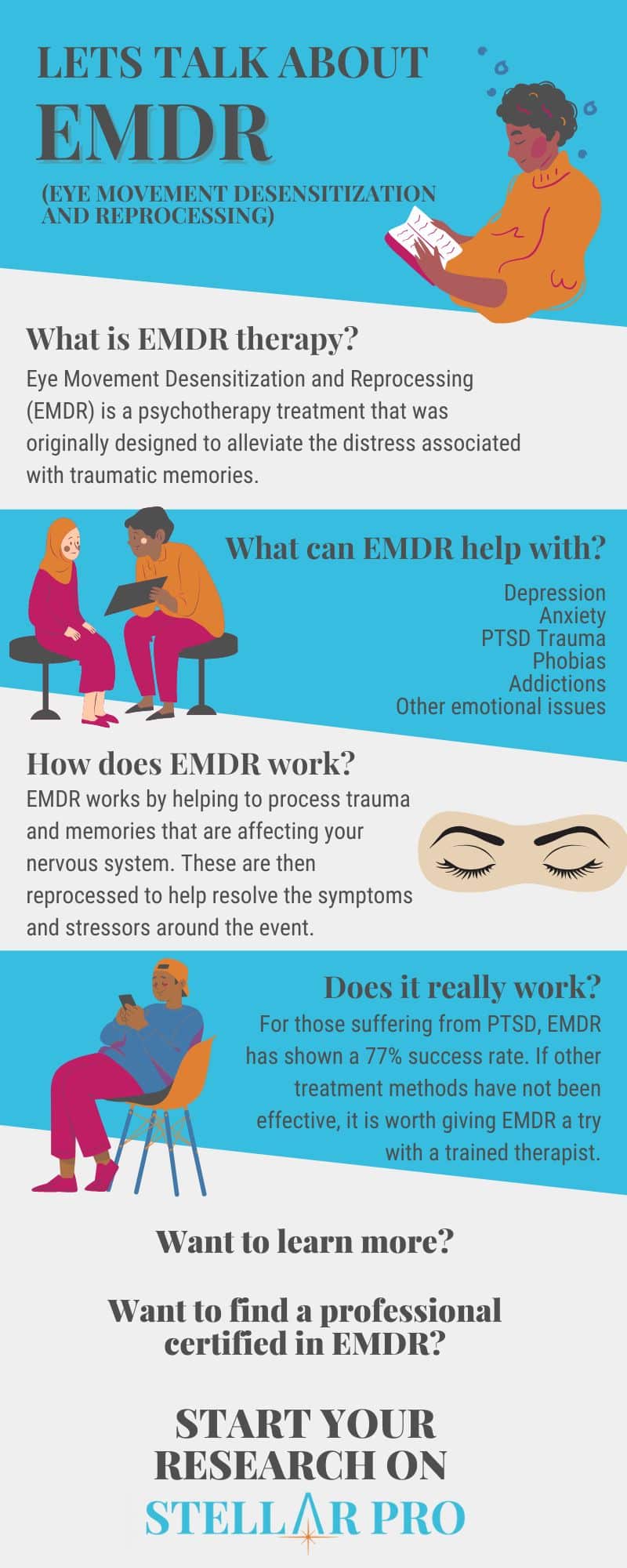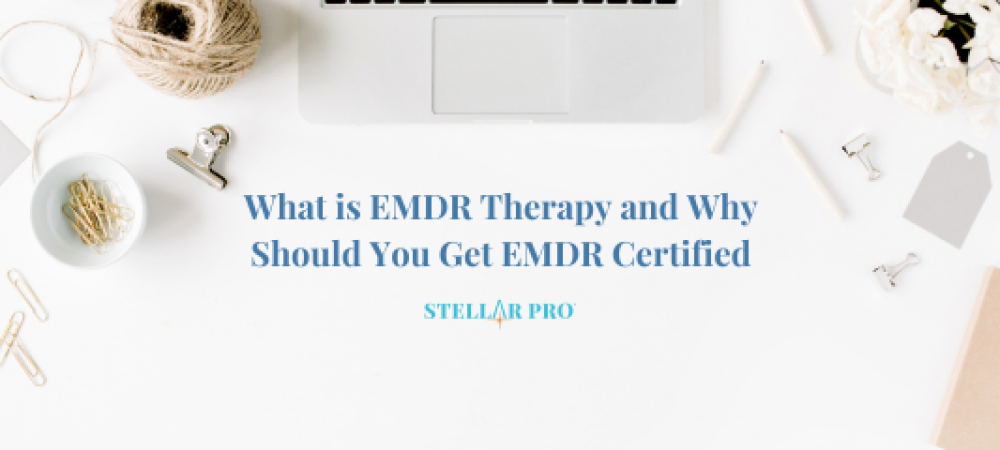EMDR therapy is a highly effective form of trauma therapy that helps individuals address and process emotionally traumatic memories, experiences, and beliefs. It has become one of the leading forms of treatment for anxiety, depression, PTSD, and other mental health disorders.
In this article, we discuss what EMDR therapy is and how it works, who it’s for, as well as why you should consider getting your EMDR certification to become a certified EMDR therapist. We’ll also explore the process involved in becoming an EMDR practitioner and answer some frequently asked questions about EMDR therapy.
What is EMDR (Eye Movement Desensitization and Reprocessing)?
Eye Movement Desensitization and Reprocessing (EMDR) therapy is a form of psychotherapy that has been proven to be effective in treating trauma-related disorders such as post-traumatic stress disorder (PTSD), anxiety, depression, and addiction. EMDR therapy is based on the idea that traumatic memories are stuck in the brain and can be reactivated by triggers, causing distress and negative emotions. During EMDR therapy, clients are guided through a series of eye movements, taps, or sounds while recalling the traumatic memory, which helps to reprocess the memory in a less distressing way. According to the EMDR Institute, EMDR therapy can be effective in as few as 6 to 12 sessions.
EMDR therapy is a powerful tool for mental health professionals who want to help their clients heal from trauma. The importance of EMDR Certification cannot be overstated, as it demonstrates an advanced level of training and knowledge in the field. EMDR Certification is earned through additional training and supervised practice, and demonstrates that the therapist is committed to the highest standards of care in treating trauma-related disorders.
In addition to the standard training, there are also courses available to further deepen your understanding of EMDR therapy. These courses include Advanced Clinical Workshops, Professional Consultation, and EMDR Therapy for Children and Adolescents.
As stated by the EMDR Institute, “EMDR therapy has been declared an effective trauma treatment by a wide range of organizations including the World Health Organization (WHO), the American Psychiatric Association (APA), the Department of Defense (DoD), and the Department of Veterans Affairs (VA).” With its proven effectiveness and widespread recognition, seeking EMDR Certification is a valuable investment in your career as a mental health professional.

How Does EMDR Therapy Work?
EMDR therapists use a variety of techniques to help clients reprocess traumatic memories, including eye movements, taps, and sounds. This technique uses bilateral stimulation to activate both sides of a client’s brain, which in turn helps to process the memory more effectively.
During an EMDR therapy session, the client is asked to recall the traumatic memory while focusing on a specific external stimulus, such as the therapist’s hand moving back and forth or a sound played in alternating ears. The client then reports what comes up for them, whether it’s a new insight, different emotion or reduced intensity. This process continues until the client feels more comfortable with the memory and it no longer triggers them in the same way.
EMDR therapy has been shown to be effective for a variety of conditions, including PTSD, anxiety, depression, phobias, and more. It allows individuals to gain insight and perspective on the traumas they have experienced, while also reducing levels of emotional distress.
Who is EMDR Therapy for?
EMDR Therapy is a type of therapy that has been proven to be effective in treating issues such as anxiety, depression, trauma, and PTSD. This therapy targets reprocessing of trauma memory and balancing the brain’s chemistry, and can be used in combination with other therapies. EMDR therapy is not limited to any particular age or demographic, and can be used for individuals who have experienced any form of trauma in their life. This includes individuals who have experienced natural disasters, physical or emotional abuse, accidents, or any other traumatic experiences. It can also be used for those who suffer from any psychological disorders such as depression, panic or anxiety.
EMDR therapy is a safe and relatively quick process that aims to reprocess the past traumatic experiences and shift the thoughts to live in the present. This therapy technique is very simple and involves movements that increase communication between the left and right side of the brain leading towards more comprehensive thinking patterns. With each EMDR session, the individual will be able to explore their past experiences in a more healthy way, leading to new insights, feelings of self-control, and positive outcomes.
Getting your EMDR certification can be of great value, allowing you to help individuals who need therapy during their most vulnerable moments. Becoming a certified EMDR therapist will allow you to learn from experts on how to deal with patients with a wide range of traumatic experiences, provide deep understanding of eye movement techniques, and provide solid support to individuals who really need it. It also provides you with a self-satisfying career that helps you to genuinely make a difference in people’s lives by providing therapeutic relief.
Benefits of EMDR Therapy
EMDR is a type of therapy that is gaining popularity among mental health professionals due to its successful outcomes. EMDR therapy is mainly used to treat individuals who have experienced trauma, including PTSD, anxiety, depression, and panic disorders. The therapy involves stimulating the brain through eye movements, sounds, or taps to reprocess negative experiences that are stored in the brain. According to research, EMDR therapy can bring relief to traumatic symptoms in as little as 3 sessions. The benefits of EMDR therapy are numerous and can change someone’s life. Researchers have found that EMDR therapy can help people effectively process traumatic memories, decrease anxiety and depression symptoms, and improve negative self-beliefs. It can also help people maintain emotional stability during difficult times and allow them to see things in a more positive light.
Some certified EMDR practitioners also report that the therapy can be helpful in other areas, such as addiction recovery and phobia treatment. There are many reasons to consider getting trained and certified in EMDR therapy. Certified EMDR professionals are in high demand due to its success rate, and EMDR therapy can help practitioners expand their practice and reach new clients. Additionally, getting certified in EMDR therapy can be personally rewarding, as it allows practitioners to help individuals process their traumas and move towards a healthier future.
In order to get certified in EMDR therapy, the first step is to ensure that you meet the basic requirements, including being a licensed mental health professional with at least two years of clinical experience. From there, you can enroll in an EMDR training program, which typically takes about 50 hours. The training program will teach you the theoretical framework behind EMDR, how to assess clients, and how to administer the therapy. Once you complete the program, you can begin practicing EMDR under the supervision of a qualified clinician until you are experienced enough to practice independently.
How EMDR Therapy Can Help with Trauma
EMDR (Eye Movement Desensitization and Reprocessing) therapy is a powerful treatment that can help individuals overcome trauma and other emotional challenges. Unlike traditional talk therapy, EMDR therapy utilizes a bilateral stimulation technique to help the brain reprocess traumatic memories and experiences. During an EMDR therapy session, the client is asked to recall a disturbing memory while following the therapist’s hand movements or other bilateral stimulation techniques. By doing so, the client can process the memory and release any negative associations or emotions associated with it. EMDR therapy is highly effective for individuals suffering from PTSD, anxiety, depression, and a range of other emotional challenges. According to studies, EMDR therapy has been found to be just as effective as traditional talk therapy, and can often produce results in a shorter amount of time.
There are several key benefits to getting EMDR certified. First and foremost, becoming certified in EMDR therapy can open up a whole new area of practice for mental health professionals. By expanding their skillset to include EMDR therapy, clinicians can better serve their clients and meet the growing demand for trauma-focused treatments. Additionally, EMDR certification is highly respected in the mental health community and can enhance a clinician’s reputation and credibility. Finally, becoming an EMDR certified therapist can significantly increase a clinician’s earning potential, as EMDR therapy is often covered by insurance and can command higher rates than traditional talk therapy.
How EMDR Therapy Can Help with Performance Anxiety
If you’ve ever experienced performance anxiety, you know how debilitating it can be. EMDR therapy is a highly effective treatment for anxiety, including performance anxiety. It works by allowing the brain to reprocess traumatic memories and emotions, allowing individuals to modify negative thought patterns and behaviors related to anxiety. During an EMDR therapy session, clients focus on negative memories or emotions while simultaneously engaging in a left – right movement, such as following a light back and forth with their eyes or tapping their hands. This bilateral stimulation is thought to activate the brain’s information processing system, facilitating the integration of previously disturbed information. Additionally, EMDR encourages a client-centered approach, allowing individuals to guide their own healing process.
EMDR therapy has been found to be effective for a wide range of issues, including PTSD, depression, anxiety, and phobias. It has also been shown to be effective for improving performance anxiety in athletes, musicians, and other performers. According to Jana B. Eggers, CEO of Nara Logics, “EMDR therapy helped me go from holding steady to feeling in control and confident while presenting, even in high-pressure situations.”
So, if you’re struggling with performance anxiety, EMDR therapy may be a game-changer. It’s important to note that EMDR therapy should only be administered by trained and licensed clinicians who have completed specialized EMDR training. Getting your EMDR certification will not only allow you to provide this valuable therapy to those who need it but also enhance your credibility and expertise in the field.
How EMDR Therapy Can Help with Depression
Eye Movement Desensitization and Reprocessing therapy is a research-backed treatment that has been found to be effective in treating depression. Unlike traditional talk therapy, EMDR therapy focuses on the negative emotions and beliefs associated with traumatic experiences. EMDR therapy uses a structured eight-phase approach to reprocess traumatic memories to help individuals reduce the negative emotions and beliefs associated with these experiences.
EMDR therapy can help individuals struggling with depression by reducing the negative emotions and beliefs associated with past traumatic experiences. This is crucial because negative beliefs and internalized feelings of blame or shame can contribute to depression. By using EMDR therapy to reprocess these traumatic memories, individuals can reduce emotional distress and improve their overall mental health.
One study found that EMDR therapy improved not only depressive symptoms but also overall quality of life. Additionally, EMDR therapy was found to be just as effective as traditional forms of talk therapy in treating depression.
If you are a mental health professional looking to expand your practice, getting certified in EMDR therapy could be a valuable addition to your skill set. EMDR certification requires specialized training and education, but the benefits are clear. By becoming certified in EMDR therapy, you would be able to offer an evidence-based treatment for individuals suffering from depression and other conditions affected by traumatic experiences.
Get Your EMDR Certification
What is an EMDR Certification?
EMDR certification is a rigorous training program that equips mental health professionals with the knowledge and skills needed to provide effective EMDR therapy. The certification program includes both didactic and practical training, followed by a certification exam to ensure that the therapist has the necessary knowledge and experience to deliver high-quality EMDR treatment.
According to the EMDR International Association (EMDRIA), the benefits of becoming EMDR certified are numerous. It leads to an increased understanding and competence in trauma treatment. It also enhances professional credibility and reputation, and provides a competitive edge in the job market.
To become certified in EMDR, one must have a clinical license and have completed an EMDR Basic Training program from an EMDRIA-approved provider. After that, a certain number of supervised EMDR cases must be completed before taking the certification exam.
So, who should get EMDR certified? Mental health clinicians who work with individuals who have experienced trauma, anxiety, PTSD, and other emotional disorders should consider getting certified in EMDR therapy. With the growing need for trauma-informed care, EMDR certification can be a valuable addition to a clinician’s skill set.
What Does an EMDR Certification Entail?
If you’re interested in becoming an EMDR therapist, it’s important to understand what an EMDR certification entails. EMDR therapy stands for Eye Movement Desensitization and Reprocessing, which is a psychotherapy approach that helps clients process traumatic memories and reprocess them in a healthier way. To become an EMDR therapist, you need to complete a specific training program that covers the eight phases of EMDR therapy, which include history-taking, preparation, assessment, desensitization, installation, body scan, closure, and reevaluation.
During the EMDR certification program, you will also engage in supervised practice sessions where you’ll work with real clients to gain hands-on experience. This will enable you to put your theoretical knowledge into practice and fine-tune your skills in a real-world setting.
Once you have completed the EMDR certification program and received your certification, you will be able to use your newly acquired skills to help clients struggling with trauma, PTSD, anxiety, and depression, among other mental health concerns. As a certified EMDR therapist, you will also be able to offer a unique and effective therapeutic approach that can help your clients heal from emotional pain and lead happier, more fulfilling lives.
What Does an EMDR Practitioner Do?
As an EMDR practitioner, your main goal is to help your clients overcome traumatic experiences and negative emotions that are keeping them from living a healthy and fulfilling life. To achieve this, you will use Eye Movement Desensitization and Reprocessing (EMDR) therapy, a psychotherapy approach that has been proving to be highly effective in the treatment of trauma-related disorders. EMDR therapy works by stimulating the brain’s natural healing process through bilateral stimulation, which involves the use of eye movements or other forms of sensory stimulation. This helps to reprocess traumatic memories, replacing negative emotions and thoughts with positive ones. EMDR therapists are trained to help clients identify past experiences that are hindering them in their present lives, and to guide them through the process of reprocessing these memories. By gaining your EMDR certification, you will become proficient in using this powerful therapeutic technique to help clients overcome anxiety, depression, and other psychological disorders associated with trauma. With EMDR certification, you will be able to communicate to potential clients and employers that you have the expertise and experience to help them overcome their struggles.
Benefits of EMDR Certification
EMDR therapy has become a popular form of psychotherapy that can be used to treat a variety of mental health disorders. Unlike traditional talk therapy, EMDR therapy focuses on trauma and helps the patient to process and reframe their traumatic experiences. To become a certified EMDR therapist, you must complete an approved training program that covers the eight phases of EMDR therapy. Here are some of the benefits of becoming EMDR certified:
Elevated Credibility and Expertise
Becoming certified in EMDR therapy shows a level of dedication and knowledge in the field. It can improve your credibility as a therapist and make you more attractive to potential clients. In addition, it demonstrates expertise in the area of trauma and the ability to treat patients with complex PTSD.
Wider Range of Treatment Options
EMDR therapy is a widely recognized and highly effective form of treatment for PTSD, anxiety, and other disorders. As an EMDR certified therapist, you can offer your patients a wider range of treatment options that can help them to heal and recover from traumatic experiences.
Opportunities for Professional Development
EMDR certification requires ongoing training and continuing education courses. This means that you have opportunities for professional growth and development as you continue to learn and improve your skills as a therapist.
Increased Earning Potential
In many cases, becoming EMDR certified can lead to an increase in earning potential. As a highly specialized and sought-after form of therapy, EMDR certification can give you the ability to charge a premium rate for your services.
Conclusion
EMDR therapy is a powerful therapeutic technique that can be used to help people overcome a variety of mental health issues, including PTSD, anxiety disorders, and depression. Through a combination of eye movement, tapping, or audio stimulation, EMDR therapy helps clients access and process traumatic memories or negative thought patterns.
If you’re considering becoming an EMDR therapist, it’s important to understand the theory and practice behind the technique. EMDR therapy requires specialized training and certification to ensure its proper use and effectiveness. Becoming an EMDR therapist can be a rewarding and fulfilling career, knowing that you are helping people overcome their struggles and lead fulfilling lives.




